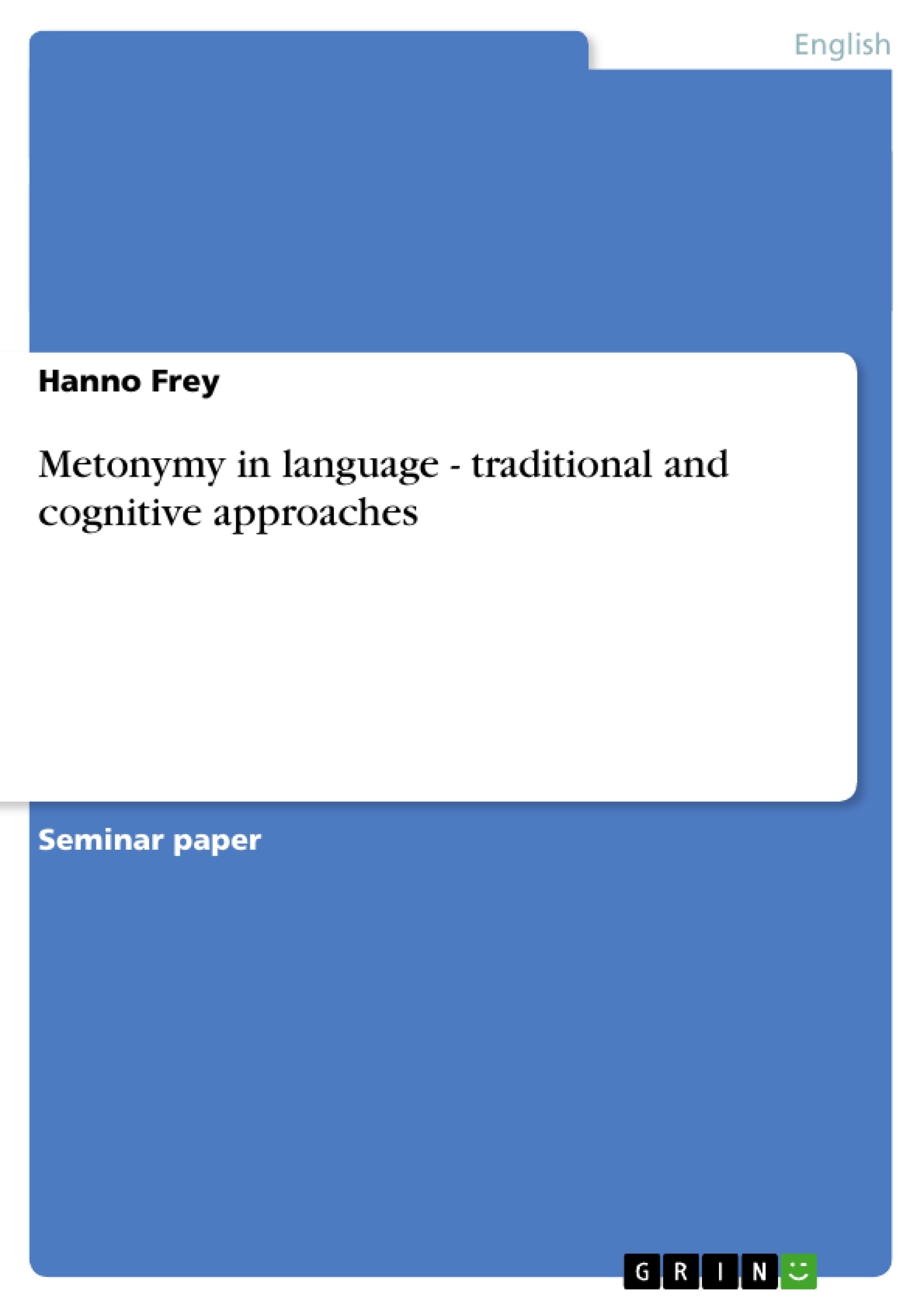Effective communication is a key process in everyday life. Not only do we need to communicate about business and public affairs but also about ourselves and the things which concern us personally. In each case, it is highly interesting to analyse how we try to convey the information we want to get across: Naturally enough, we make use of conventional language but we are also creative and constantly invent new words, phrases and formulations. This, according to Andreas Blank, is due to the fact that: “Linguistic ( and even nonlinguistic) communication can be seen as a process whereby people try to maximize their communicative success by minimalizing their linguistic effort” (1993, p. 6). Metonymy is a response to both demands and the nature of metonymy will be investigated in some depth in the following overview. For his purpose, it is necessary to compare traditional and cognitive approaches to metonymic theory and also to clearly distinguish the linguistic device of metonymy to one that can be considered as being rather similar- metaphor. It will be shown, however, that there are important differences between the two, which account for their specific linguistic usage and behaviour.
Inhaltsverzeichnis (Table of Contents)
- OVERVIEW PAPER
- Introduction
- The traditional view
- The cognitive approach
- Introduction
- Langacker's model of reference-point construction
- Reference-point construction
- WHERE AND WHEN DOES METONYMY OCCUR?
- ARE THERE ANY PREFERRED ROUTES?
- Principles governing the selection of the preferred vehicle
- WHAT LEADS TO THE SELECTION OF OTHER ROUTES?
- Conclusion
- METONYMY VS. METAPHOR
- Introduction
- Examples
- SELECTED BIBLIOGRAPHY
Zielsetzung und Themenschwerpunkte (Objectives and Key Themes)
This paper examines the phenomenon of metonymy from both traditional and cognitive linguistic perspectives. It aims to compare and contrast these approaches, emphasizing the cognitive nature of metonymy and its role in language and thought.
- The evolution of metonymy research from traditional to cognitive perspectives
- The cognitive model of metonymy as a reference-point phenomenon
- The role of frames and conceptual domains in metonymic understanding
- The distinction between metonymy and metaphor in language
- The relevance of metonymy in everyday communication and its impact on language structure
Zusammenfassung der Kapitel (Chapter Summaries)
The paper begins by outlining the traditional view of metonymy as a figure of speech involving substitution of one linguistic expression for another. This traditional view is then contrasted with the cognitive approach, which emphasizes the relational nature of metonymy and its role in conceptualization. The cognitive perspective, particularly Langacker's model of reference-point construction, is further explained, highlighting how metonymic expressions serve as reference points for accessing the intended target concept.
The paper explores the conditions under which metonymy occurs, examining the principles governing the selection of preferred routes and the factors leading to the selection of other routes. The distinction between metonymy and metaphor is also addressed, emphasizing their different linguistic functions and behaviors.
Schlüsselwörter (Keywords)
Key terms and concepts explored in this paper include metonymy, metaphor, cognitive linguistics, reference-point construction, frames, conceptual domains, traditional view, cognitive approach, linguistic expression, conceptualization, and communication.
Frequently Asked Questions
What is the difference between metonymy and metaphor?
Metaphor involves a mapping between two different conceptual domains based on similarity, while metonymy occurs within a single domain or frame based on contiguity or association.
What is the cognitive approach to metonymy?
The cognitive view, such as Langacker’s model, sees metonymy as a reference-point construction where one entity provides mental access to another related entity.
Why do we use metonymy in communication?
Metonymy allows speakers to minimize linguistic effort while maximizing communicative success by using easily accessible "vehicles" to refer to complex "targets."
What are "conceptual domains" in metonymy?
They are mental frameworks or "frames" where entities are linked (e.g., Producer for Product). Metonymy operates by shifting focus within these shared contexts.
What was the traditional view of metonymy?
Traditionally, metonymy was viewed merely as a figure of speech or a literary device involving the substitution of one word for another related word.
- Citation du texte
- Hanno Frey (Auteur), 2001, Metonymy in language - traditional and cognitive approaches, Munich, GRIN Verlag, https://www.grin.com/document/15412



